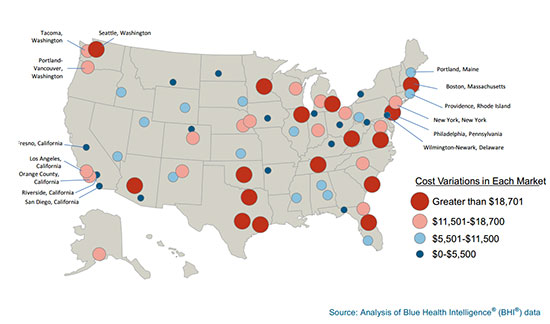Price Variations in Healthcare Have Financial Consequences for Providers

Study shows a 313 percent difference in cost depending on the market in which the procedure took place.
- If a patient is in need of new knees or hips, they may shop around for the most cost-saving surgery option. BlueCross BlueShield (BCBS) published a new study that shows the varying price ranges for hip and knee replacements based on which hospital performed the procedure. In order to maintain a healthy stream of consumer revenue, healthcare providers and insurance companies must work to compile data to show their facilities provide the best value for their quality of care.

The survey reviewed hip and knee replacement procedures in 64 different markets across the country. It focused on these procedures specifically because they are some of the fastest growing procedures on the market. Their findings showed a 313 percent difference in cost depending on the market in which the procedure took place.
On average, the study indicated that a median typical cost for knee-replacement surgery was $31,124. Yet prices ranged from as high as $69,654 in New York, New York and as low as $11,317 in Montgomery, Alabama.
Similarly, the study indicated a large difference in the prices for hip-replacement surgery. The median price for a hip-replacement is $30,124, yet it could cost as much as $73,987 in Boston, Massachusetts and as little as $11,327 in Birmingham, Alabama.
“Extreme price variation in healthcare can have obvious financial consequences for individuals and employers as well as serious implications for the sustainability of a U.S. healthcare system that is exceeding its economic capacity,” Maureen Sullivan, senior vice president of strategic services and chief strategy officer for BCBSA, saidin the report’s press release. “To effectively address healthcare costs and ensure access to care, consumers, employers and industry leaders must have information on these price variations and be provided with the tools to become informed shoppers.”
As the economy gradually heals, and the Affordable Care Act (ACA) allows more coverage to previously uninsured patients national healthcare spending is anticipated to increase. Medicare has predicted that healthcare costs will increase by approximately 5.7 percent annually. Providers should ensure that they are ready to compete with other healthcare facilities for the wave of newly insured consumers.
A report published on EHRIntelligence.com, concluded that the end of 2015 would be a turning point for healthcare spending. It surmised that although studies predicted economic growth would be slower than in the past, it would be much improved from the dimmed annual growth rates during the recession. This will be driven by the demand for healthcare coverage, services and goods that increase with the economy. Though at the time, it was unclear how the implementation of the ACA would impact healthcare spending.
Another report on RevCycleIntelligence.com, indicated a growing optimism for financial status for 2015 and less concern about the healthcare reforms. Specifically, 68 percent of industry leaders predicted that financially this would be a good year for their healthcare business.

